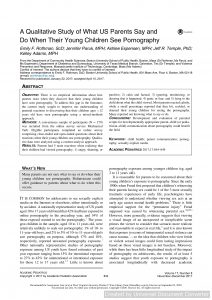Sexuality Education & Therapy with Children
A Qualitative Study of What US Parents Say and Do When Their Young Children See Pornography
 Full Article Name: A Qualitative Study of What US Parents Say and Do When Their Young Children See Pornography
Full Article Name: A Qualitative Study of What US Parents Say and Do When Their Young Children See Pornography
Open Access: No
Abstract
Relevance
“First, the parental experience of discovering that a young child has viewed pornography can be upsetting for some parents. Many parents in this sample reported feeling paralyzed, unsure what to say, afraid of the impact on their child, or nervous about how to respond.”
“Second, although it was rarely reported, some parents hit, scolded, or shamed their young children when they discovered that they have seen pornography. Harsh parenting practices are associated with a host of negative outcomes, and there is no evidence to suggest that the practice of spanking, threatening, or scaring a child as a method for inhibiting future pornography use, or any other risky behavior, is effective.”
“Third, some parents look the other way (ie, ignore) their young children’s exposure to pornography. Whether this is a beneficial or appropriate parenting response may depend on the situation and the age of the child, but on the whole, evidence suggests that parents who are able to communicate factually with their children about sexuality and sex generally have healthier and more well-adjusted children.”
“Fourth, some parents are in favor of pediatricians giving them brief advice, pamphlets, or directing them to other educational resources that would better equip them to talk with their children about pornography. The development of simple, nonjudgmental, evidence-based guidance for parents is needed. Pediatricians may also need education and information about what parents should say and do when young children see pornography.”
None of the parents in this study ‘reported that they found out that their child had seen pornography because they asked them directly, unprompted. Parents may need guidance on how to ask such a question. A contribution to health promotion would be the development of age-appropriate and culturally relevant scripts for parent–child conversations about pornography.” Additionally, “many of the parents in the sample expressed feeling distressed, upset, terrified, panicked or having ‘no clue what to do’ when their young children saw pornography.” Culture Reframed has a range of materials, such as our parents programs, to help guide parents in conversations with children of all ages; we also have advice on what to do if a young child encounters pornography (e.g., “Responding to Your Child Accessing Porn” and our report, “Preschool Screen Time & Internet Safety: Helping Young Children Use Digital Devices Safely (and How to Respond if They See Pornography)”).
Citation
Rothman, E. F., Paruk, J., Espensen, A., Temple, J. R., & Adams, K. (2017). A qualitative study of what US parents say and do when their young children see pornography. Academic Pediatrics, 17, 844–849. https://doi.org/10.1016/j.acap.2017.04.014
